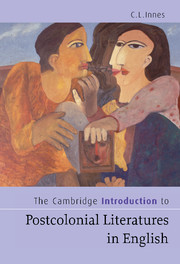Book contents
- Frontmatter
- Contents
- Preface
- Chapter 1 Introduction: situating the postcolonial
- Chapter 2 Postcolonial issues in performance
- Chapter 3 Alternative histories and writing back
- Chapter 4 Authorizing the self: postcolonial autobiographical writing
- Chapter 5 Situating the self: landscape and place
- Chapter 6 Appropriating the word: language and voice
- Chapter 7 Narrating the nation: form and genre
- Chapter 8 Rewriting her story: nation and gender
- Chapter 9 Rewriting the nation: acknowledging economic and cultural diversity
- Chapter 10 Transnational and black British writing: colonizing in reverse
- Chapter 11 Citizens of the world: reading postcolonial literature
- Notes
- Glossary of terms used (compiled by Kaori Nagai)
- Biographies of selected postcolonial writers (compiled by Kaori Nagai)
- Brief colonial histories: Australia, the Caribbean, East Africa, India and Pakistan, Ireland, West Africa (compiled by Kaori Nagai)
- Select bibliography
- Index
Chapter 2 - Postcolonial issues in performance
Published online by Cambridge University Press: 05 June 2012
- Frontmatter
- Contents
- Preface
- Chapter 1 Introduction: situating the postcolonial
- Chapter 2 Postcolonial issues in performance
- Chapter 3 Alternative histories and writing back
- Chapter 4 Authorizing the self: postcolonial autobiographical writing
- Chapter 5 Situating the self: landscape and place
- Chapter 6 Appropriating the word: language and voice
- Chapter 7 Narrating the nation: form and genre
- Chapter 8 Rewriting her story: nation and gender
- Chapter 9 Rewriting the nation: acknowledging economic and cultural diversity
- Chapter 10 Transnational and black British writing: colonizing in reverse
- Chapter 11 Citizens of the world: reading postcolonial literature
- Notes
- Glossary of terms used (compiled by Kaori Nagai)
- Biographies of selected postcolonial writers (compiled by Kaori Nagai)
- Brief colonial histories: Australia, the Caribbean, East Africa, India and Pakistan, Ireland, West Africa (compiled by Kaori Nagai)
- Select bibliography
- Index
Summary
Drama has played a crucial part in the development of national cultures and audiences, and yet has received relatively little attention in postcolonial literary studies. This is all the more surprising given that dramatic performance raises so many issues that are central to postcolonial cultures – questions of identity, language, myth and history; issues regarding translatability, voice and audience; problems relating to production, infrastructures and censorship. In The Wretched of the Earth (1965), it is drama rather than poetry or the novel that Frantz Fanon advocates as the best means of raising the consciousness of people involved in an anticolonial struggle. In cultures where literacy has been confined mainly to a small elite group, and where there is a continuing oral culture with roots in precolonial traditions, drama and performance provide a means of reaching a much wider indigenous audience and tapping into forms and conventions which are already familiar to them. As W. B. Yeats wrote in retrospect in his Autobiographies (1926), ‘the great mass of our people, accustomed to interminable rhetorical speeches, read little, and so from the very start we felt that we must have a theatre of our own’.
Thus Yeats, Lady Gregory and Edward Martyn set out in 1897 to create an Irish Literary Theatre (using the term ‘literary’ to emphasize that it would not cater to purely commercial interests). They stated their aims thus:
We propose to have performed in Dublin in the spring of every year certain Celtic and Irish plays, which whatever be their degree of excellence will be written with high ambition, and so to build up a Celtic and Irish school of dramatic literature.[…]
- Type
- Chapter
- Information
- Publisher: Cambridge University PressPrint publication year: 2007

